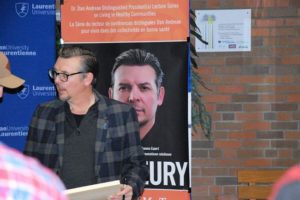Fleury advocates for self-compassion, pride in communities

By Laura E. Young
SUDBURY – Theo Fleury doesn’t know exactly how he could play hockey at the highest levels – while rarely sleeping and dealing with drug and alcohol addiction and severe emotional trauma.
He just figures it had to be part of a plan.
“That’s the only way I can explain it. I had to survive somehow and manage my emotional pain and suffering. When I was on the ice, I was in my happy place. Eventually, towards the end of my career, it wasn’t so much my addictions, it was my mental health that I couldn’t handle,” Fleury said.
Fleury was the keynote speaker at the seventh edition of the Dr. Dan Andreae Distinguished Presidential Lecture Series on Living in Healthy Communities on January 24 at Laurentian University.
Fleury said that he didn’t know about mental health or that he was depressed and anxious.
“Getting kicked out of the game was probably a gift. It torpedoed me onto a different path.”
Fleury enjoyed a stellar NHL career that included Stanley Cup, Olympic and World Junior championships. He retired in 2003 and nearly killed himself shortly after retiring.
He had suffered deeply from childhood trauma, which he recounts in his bestselling memoir, and follows up in his raw and often funny conversation of how he managed to move forward to a life spent sharing his story and motivating audiences across North America.
Fleury, of Métis heritage, is head of Fleury Enterprises, a foundation that creates conversation on trauma, mental health and resilience. Over the past decade, he has visited 370 Indigenous communities across Canada, as well as visits with non-Indigenous groups. His number of visits will continue to grow this year when he visits Labrador for an eight-day speaking tour later this month.
Fleury sought his Métis spiritual roots as part of his healing. He is an honorary chief of the Skiskia Nation, and a pipe carrier who drums and sings and attends powwows.
Those roots were taken away with the Church and through residential schools that were created with the goal of “breaking the Indian within the Indian”, he said.
“[The Church] failed because we’re still here and we’re still practising. I see a slow movement, but we’re moving back to that direction. I remind them of how great we were and how much resilience we have and pride.”
He believes there remains a need to instill pride back into the communities and in all of the tools “that were left behind by the Grandmothers and the Grandfathers and the Creator. They left them here because they knew we were going to need them.”
While he addressed forgiveness through his own experience – this includes sexual abuse for years at the hands of his junior hockey coach – he acknowledges that forgiveness takes time.
“If you’re not on a path of healing, you’re probably not thinking about forgiveness. You’re thinking about how you’re going to get your next drink, your next pill. I just go in and talk about [my] experience, strength and hope.”
In the meantime, there is concrete movement at his foundation in Calgary. They are in the process of acquiring full charitable status, which he hopes happens by the summer. Then they can fundraise on a large scale, he said.
He ultimately sees development of a healing-type centre that includes space for yoga, meditation and the foundation’s successful meetups.
The approach of meetups, a relatively informal session where anyone can come in and talk, has become so successful that other communities have been asking for information about it.
They are in the process of developing a way to share the formula but there has to be a concrete plan and they have to be “very careful” how it’s put in place, he said.
“It takes somebody who is skilled in the therapy world to run one of these sessions because they can escalate pretty quickly when somebody gets triggered. You need to have the skills to be able to diffuse what’s going on. Otherwise, you’re going to hurt more people than you help,” Fleury noted.
There is no timeframe “because we need to get this right. I know the success of the program for us and how many lives we’ve been able to affect. I’ve been doing this for 10 years. We want to make sure we have really great guidelines in place.”
The Dr. Dan Andreae lectures focus on the broad topic of healthy communities, seeking to inform, inspire, stimulate, and touch the heart, said Dan Andreae after Fleury’s conversation at Laurentian University on January 24.
Andreae says the issue of mental health is more on the radar and hoped people found a message of hope in Fleury’s conversation with them at Laurentian.
“He focuses much on the psychological aspect, the idea of self-healing, self-acceptance, care, self-love, the idea of a balance in life and really developing a relationship with yourself.”
Additionally, Andreae added that he would like the lecture series to address different specific Indigenous issues. He is looking for ideas on specific topics and speakers.
Further reading:
Conversations with a Rattlesnake: Raw and Honest Reflections on Healing and Trauma, by Theo Fleury and Kim Barthel
Playing with Fire, by Theo Fleury with Kirstie McLellan Day (Harper Collins, 2009)
Social Media:
Twitter: @TheoFleury14
Facebook: healingthroughconnections
Tags: #TheoFleury, #hockey, #healing, #mentalhealth, #Calgary, #Métis


